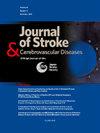Multiomics analysis demonstrated a strong correlation between lipid-mediated chronic kidney disease and stroke: Potential benefits of affected patient cohorts
IF 1.8
4区 医学
Q3 NEUROSCIENCES
Journal of Stroke & Cerebrovascular Diseases
Pub Date : 2025-03-11
DOI:10.1016/j.jstrokecerebrovasdis.2025.108285
引用次数: 0
Abstract
Objective
Patients with chronic kidney disease (CKD) exhibit a disproportionately elevated risk of stroke, frequently compounded by renal impairment. Therapeutic strategies for stroke based on Traditional Chinese Medicine's 'kidney–brain axis' theory demonstrate clinical efficacy, indicating that there may be a potential association between chronic kidney disease and stroke, which needs further exploration and verification.
Methods
In this study, databases such as GEO, NHANES, and GWAS were used to collect data related to CKD and stroke. GEO gene data enrichment analysis was used to explore possible mediating factors between CKD and stroke. NHANES clinical data were used to verify the GEO data analysis results. Mendelian randomization was used to confirm the causal relationship between CKD and stroke and verify the association effect of mediating factors in these two diseases.
Results
Cross-gene analysis and transcription factor analysis of GEO data revealed that lipid-related pathways may have a mediating effect on the relationship between CKD and stroke. Logistic regression analysis based on NHANES data revealed that changes in LDL-C, HDL-C, TC, and TG can affect the occurrence of stroke. Mendelian randomization analysis was used to determine the causal relationship between CKD and stroke and verified the mediating effects of lipid factors, such as LDL-C, HDL-C, TC, and TG, indicating that LDL-C, HDL-C, TC, and TG may be potential mediating factors for these two diseases. Our findings highlight the clinical relevance of lipid pathways in bridging CKD and stroke. By integrating predictive biomarkers and multi-level diagnostics, this study paves the way for AI-driven precision medicine in stroke prevention. Specifically, machine learning approaches could enhance risk stratification of high-risk CKD cohorts, enabling tailored interventions such as lipid-lowering therapies and personalized monitoring protocols. These strategies align with emerging paradigms in healthcare benefits and population-specific management.
Conclusion
This study provides new insights into the interactive relationship between CKD and stroke and provides a scientific basis for the process of syndrome differentiation and the treatment of stroke under the guidance of the "kidney–brain correlation". Moreover, the influence of mediating factors related to lipid metabolism on the occurrence of these two diseases was investigated, which deepened researchers' understanding of the potential association mechanism between the two diseases.
多组学分析表明,脂质介导的慢性肾病与中风之间存在密切联系:受影响患者队列的潜在益处。
目的:慢性肾脏疾病(CKD)患者卒中风险增高,且常伴有肾脏损害。基于中医“肾脑轴”理论的脑卒中治疗策略临床疗效良好,提示慢性肾脏疾病与脑卒中之间可能存在潜在关联,有待进一步探索和验证。方法:本研究采用GEO、NHANES、GWAS等数据库收集CKD与脑卒中相关数据。GEO基因数据富集分析探讨CKD与脑卒中之间可能的中介因素。采用NHANES临床数据对GEO数据分析结果进行验证。采用孟德尔随机化方法确认CKD与卒中之间的因果关系,并验证两种疾病的中介因素的关联作用。结果:GEO数据的交叉基因分析和转录因子分析显示,脂质相关通路可能在CKD与卒中的关系中起中介作用。基于NHANES数据的Logistic回归分析显示LDL-C、HDL-C、TC、TG的变化可影响卒中的发生。通过孟德尔随机化分析确定CKD与卒中的因果关系,验证LDL-C、HDL-C、TC、TG等脂质因子的介导作用,提示LDL-C、HDL-C、TC、TG可能是这两种疾病的潜在介导因素。我们的研究结果强调了脂质通路在CKD和卒中桥接中的临床相关性。通过整合预测性生物标志物和多层次诊断,本研究为人工智能驱动的精准医疗卒中预防铺平了道路。具体来说,机器学习方法可以增强高风险CKD队列的风险分层,实现量身定制的干预措施,如降脂疗法和个性化监测方案。这些战略与医疗保健福利和针对特定人群的管理方面的新兴范例相一致。结论:本研究为CKD与脑卒中的相互作用关系提供了新的认识,为“肾脑相关”指导下的辨证论治脑卒中提供了科学依据。此外,我们还研究了脂质代谢相关的介导因子对这两种疾病发生的影响,加深了研究者对两种疾病之间潜在关联机制的认识。
本文章由计算机程序翻译,如有差异,请以英文原文为准。
求助全文
约1分钟内获得全文
求助全文
来源期刊

Journal of Stroke & Cerebrovascular Diseases
Medicine-Surgery
CiteScore
5.00
自引率
4.00%
发文量
583
审稿时长
62 days
期刊介绍:
The Journal of Stroke & Cerebrovascular Diseases publishes original papers on basic and clinical science related to the fields of stroke and cerebrovascular diseases. The Journal also features review articles, controversies, methods and technical notes, selected case reports and other original articles of special nature. Its editorial mission is to focus on prevention and repair of cerebrovascular disease. Clinical papers emphasize medical and surgical aspects of stroke, clinical trials and design, epidemiology, stroke care delivery systems and outcomes, imaging sciences and rehabilitation of stroke. The Journal will be of special interest to specialists involved in caring for patients with cerebrovascular disease, including neurologists, neurosurgeons and cardiologists.
 求助内容:
求助内容: 应助结果提醒方式:
应助结果提醒方式:


